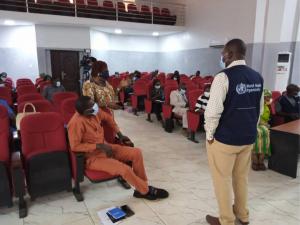WHO and partners charge journalists on credible COVID-19 reportage
As part of the nationwide response to contain the spread of COVID-19 outbreak in Nigeria, the Government with support from the World Health Organization (WHO) conducted a sensitization meeting with journalists; charging them with the responsibility of producing impactful stories to ensure information sharing that can drive home the reality of the COVID-19 pandemic.
Already, WHO has supported the training of over 500 journalists in selected high-risk states, including Kano, Kaduna, Borno, Federal Capital Territory (FCT) and Sokoto.
“When I received the invitation for a workshop on impactful reporting for COVID-19 prevention being organized by WHO and FCT public health unit, I was hesitant to attend. My reason? I thought I already have enough information and knew where to look up for more if I needed to cover press briefings, interviews and any other COVID-19 related events.
“But at the end of this workshop, I must confess that I am not only better informed about how my reportage can help to dispel COVID-19 infodemic but also control the outbreak and prevent further infection. I have sharpened my journalistic skills and motivated to explore impactful stories especially as it relates to compliance to non-pharmaceutical interventions by the public”.
As COVID-19 outbreak continues to ravage global health landscape, Nigeria is not an exception. Low risk perception, infodemic and consequent non-compliance to pharmaceutical interventions are among factors exacerbating the outbreak. WHO is collaborating with the Nigerian Centre for Disease Control, (NCDC) and partners to build the capacity of frontline information managers on impactful and credible stories for prevention of COVI-19.
A beneficiary of the WHO-supported workshop, Mr John Akubo of Guardian newspaper confessed that the workshop has widened his knowledge horizon on COVID-19. “The training has opened my eyes to some of my shortcomings as a journalist. I inform and entertain people but do very little on educating the general public especially on preventive measures for COVID-19.
"However, with this training I have learned that media practitioners can also save lives by providing the right preventive information at the right time to the right audience”.
In her remarks, Director of FCT Public Health, Dr. Josephine Okechukwu represented by Dr Abdulrahman Sadiq reaffirmed that the media are critical partners in the current response to contain COVID-19 outbreak in Nigeria. “Media practitioners are critical in helping to change behaviours and capable of enhancing the public’s compliance to non-pharmaceutical interventions. Therefore, this is an opportune workshop to strengthen the skills of these critical partners to resonate balanced reports on COVID-19”.
Technical Contacts:
Dr Rex Mpazanje; Email: mpazanjer [at] who.int (mpazanjer[at]who[dot]int); Tel: +234 803 960 0874
Dr Chima Onuekwe; Email: onuekwec [at] who.int (onuekwec[at]who[dot]int); Tel: +234 803 535 4876



